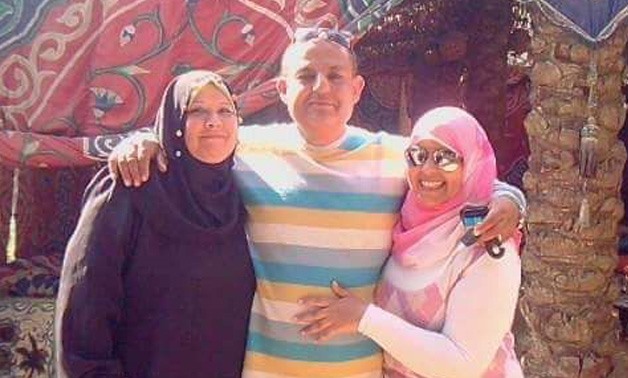
Egyptian engineer Tarek El-Henawy with his family - File Photo
CAIRO – 16 August 2017: In response to inquiries of how Egypt will deal with the case of Egyptian citizen Tarek El-Henawy, who was killed by an Italian tourist, Ministry of Foreign Affairs spokesperson Ahmed Abu Zeid affirmed Egypt will not mix criminal cases with political issues.
The incident occurred on Thursday, when Italian tourist Evan Pascal Moro and his daughter wanted to enter a construction site related to Marina Beach Resort of Marsa Allam and were prevented by El-Henawy, the site supervisor, and were asked to stay away from the site. The tourist insisted on his stance and beat El-Henawy to death.
Following the incident, the Italian tourist was imprisoned for one week pending investigation on charges of murder. The Egyptian security apparatus approved the Italian consulate’s request to visit the Italian tourist to check his status in prison. An Egyptian tourism official based in Italy traveled to Marsa Alam to take charge of the Italian national’s children, aged 6 and 15, and bring them back to Italy.
Abu Zeid said that criminal cases between two countries should be deemed a criminal context only, asserting that the reason behind why the relations between Egypt and Italy have tensioned throughout the past year came as a result of shifting the case of Italian student Giulio Regeni from a criminal issue to a political one.
The ambassador’s statements came during a phone interview on “Sabah Dream” TV show, where he spoke of Egypt’s stance regarding Italy’s decision on Monday that it would return its ambassador to Cairo after one year of withdrawal.
A number of media reports linked the return of the ambassador to Cairo with the incident of the Italian tourist killing the Egyptian site supervisor, while Egyptian officials have attributed more reason for the Italian decision, expressing keenness on good relations with Italy. They further asserted that Egypt rejects allowing criminal cases to interrupt bilateral relations.
However, Abu Zeid asserted that the General Prosecution is currently investigating the case, and whoever will be proven guilty will be punished in accordance with the state policy. He added that “it is possible the Italian consulate will interfere in the matter, but it’s preferable that the case be legally pursued.”
“We demanded that Italy not make a political issue from Regeni’s case , as this would impact the relations between the two countries. We, too, must do this,” he asserted.
In one of the recent updates of El-Henawy’s case, Mohamed Salem, a lawyer appointed by the Italian embassy to follow up on the case, has filed a request to the Red Sea Prosecution to view the case documents and to hear testimonies of the Italian tourist in order to check the developments of the case, judicial sources told local media.
The prosecution approved the lawyer’s requests and also allowed him to meet with the tourist, who is detained, pending investigations in Al-Qaser Police Station. The lawyer is also scheduled to attend with the defendant the upcoming renewal detention session, scheduled on August 19.
According to testimonies of El-Henawy’s family members, he was suffering from heart disease. In a phone interview with Moataz El-Demerdach in his “90 minutes” TV show, Henawy;s daughter asserted that she will not give up on her father’s right.
When asked about reasons of the Italian decision, Abu Zeid commented by saying that Italy has noted Egypt’s transparent role while dealing with regional issues, especially with the Libyan crisis and referred to the recent period, which has witnessed cooperation and an exchange of information between the Egyptian public prosecutor and his Italian counterpart.
The spokesperson also asserted that the recent decision highlights Italy’s willingness to not treat Regeni’s case as a hurdle that would obstruct the recovery of the strong relations between Egypt and Italy.
Meanwhile, Italian Foreign Minister Angelino Alfan noted in his statement that the main motive behind that decision is that Italy is convinced that the return of its ambassador to Cairo would strengthen relations with the Egyptian authorities and enhance judicial cooperation. It would also intensify activities to make progress in the investigations.
Egypt’s public prosecution released a statement, noting that General Prosecutor Nabil Zakareya has reviewed in a phone call with his Italian counterpart Giuseppe Pignatone the developments of Regeni’s case. The last meeting between Egyptian and Italian investigators was held in May.
The prosecutors discussed the updates regarding investigations with police officers who had investigated Regeni.
Both officials also discussed the procedures taken to recover the data on surveillance cameras at the metro station in Dokki, assigned to a German company.
On January 25, 2016, Italian postgraduate student Regeni disappeared in Cairo, only to be found dead on February 3 alongside the Cairo-Alexandria Highway, bearing signs of extreme torture and beating. This incident has tensioned relations between Egypt and Italy; however, investigations from oth sides are still ongoing on the death of the Italian student.

Comments
Leave a Comment